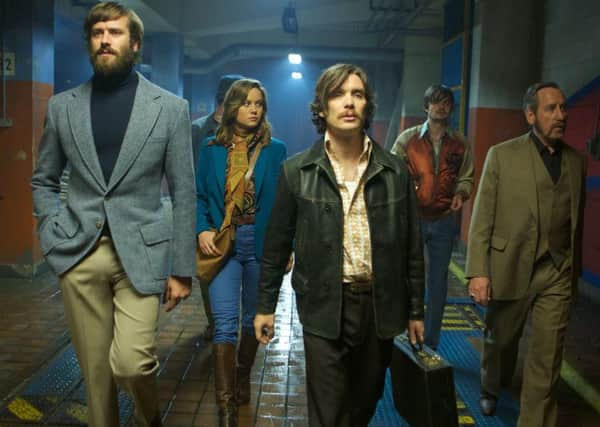Film reviews: Free Fire | Graduation | Smurfs: The Lost Village


Free Fire (15) ****
Graduation (15) ****
Smurfs: The Lost Village (U) **
In an era of bloated franchise blockbusters intent on wearing us down with extended set-pieces featuring ever-escalating mayhem and destruction, Ben Wheatley’s new film Free Fire feels like a sly joke. Unlike Wheatley’s last film, the 1970s-set JG Ballard adaptation High Rise, this isn’t trying to say anything profound or interesting about society, politics or the human condition. It has almost no socially redeeming features at all, beyond perhaps offering a blackly comic portrait of nihilism run amok.
Featuring a single warehouse location and a premise built around 12 characters embroiled in a gun battle, it is, literally, a wall-to-wall action movie, one in which a firefight occupies roughly 70 minutes of its brief 90-minute run-time. And yet the sustained and relentless bloodshed on display manages to feel shorter than the climactic sequence of an average Marvel movie – and a good deal more entertaining. In this respect it feels like a genre experiment, an exercise in pure cinema designed to solve the problem of how to tell a compelling story in almost real time with this many hateful characters all pointlessly trying to kill each other. That’s an audacious thing for a filmmaker to attempt and the good news is that Free Fire does eventually succeed on those terms, even if the airless nature of its first 20 minutes or so (which boasts no establishing shots of its location) can be a little jarring and a little wearying.
Advertisement
Hide AdSet in Boston in the late 1970s and built around an arms deal going rapidly wrong, Free Fire certainly isn’t interested in pandering to its audience by offering characters to root for. Wheatley’s cast might include the likes of Cillian Murphy, Armie Hammer, Sharlto Copley, Sam Riley and recent Oscar-winner Brie Larson, but he’s got them playing IRA members, South African gun-runners, self-interested interims and various catastrophically idiotic henchmen whose petty squabbling and myriad addictions are to deal-making what shotgun blasts are to gas cylinders.
No one really has an arc; it’s not that type of movie. Nor are there flashbacks or big declamatory speeches to signal where our sympathies should lie. This is a film that blithely adopts the F Scott Fitzgerald mantra that action defines character and makes a mockery of it by having all the action involve people shooting at each other, to the point where it becomes clear we’re not really being asked to invest in anyone’s fates here. Instead, we’re being asked to invest in the logistical bravado involved in orchestrating such bullet-spraying chaos in a way that makes narrative sense. It’s here that Wheatley starts coming into his own. Keeping his camera low, he creates a powder-keg-like environment, incrementally moving through the film’s contained space in a way that doesn’t just build up drama and tension, but also layers in darkly funny jokes with punchlines that pay-off further down the line.
The period details add to this: a ringing phone becomes an ongoing source of tension while the clothes (Hammer has the boldest look, a sort of nerdy tribute to Alien screenwriter Dan O’Bannon) serve as part loving pastiche of the era and part tribute to the heyday of straight-up genre films such as Assault on Precinct 13. Where it differs is in its acknowledgment of the absurd nature of being shot: like Tim Roth in Reservoir Dogs, anyone hit by a bullet in Free Fire takes a long time to die, which results in all the characters becoming trapped in a sort of hellish purgatory where they know they’re not long for this world and yet are intent on prolonging the suffering of anyone in close proximity for the time they have left. As the bedlam intensifies it gets funnier and weirder and more distinctively Wheatley’s film, pushing the bounds of what’s doable in a movie of this nature, but ending long before it outstays its welcome.
Romanian director Cristian Mungiu (4 Months, 3 Weeks, 2 Days) returns with another subtly devastating exploration of his home country with Graduation, a film that tells the wider story of the failed ideals of the post-Ceaușescu era through the prism of a father-daughter story that reveals the extent to which corruption has infected all aspects of life. Adrian Titieni stars as a local doctor whose teenage daughter (Maria-Victoria Dragus) is assaulted the day before she has to sit an exam that will determine whether or not she receives a potentially life-changing scholarship to study in the UK. Determined to safeguard her chances, he reluctantly lets himself be drawn into the prevalent quid pro quo culture that exists amongst Romania’s professional and bureaucratic classes, little realising that his efforts will duly infect how the daughter he’s trying to protect will subsequently operate in the world. It’s a brilliantly done piece. Though there are shades of Michael Haneke’s Hidden, it’s very much its own thing, with Mungiu’s formally rigorous approach – he never cuts within a scene – intensifying not just how trapped his protagonist becomes because of the choices he makes, but also how life can’t help but get in the way of the best laid plans.
The best that can be said about Smurfs: The Lost Village is that this latest CG animated reboot for the oddball blue Belgian comic strip characters isn’t quite as mind-numbingly awful as the last two (bafflingly successful) live-action movies from a few years ago. It’s still not great, but its efforts to focus the story on Smurfette (voiced by Demi Lovato) in order to serve up a kid-friendly tale of female empowerment makes it vaguely more palatable.